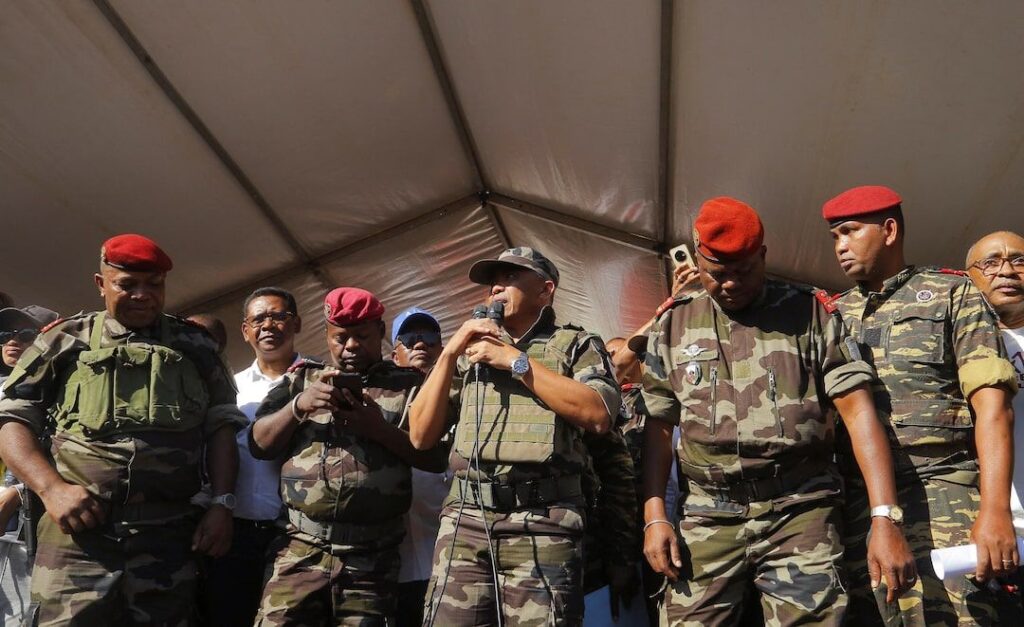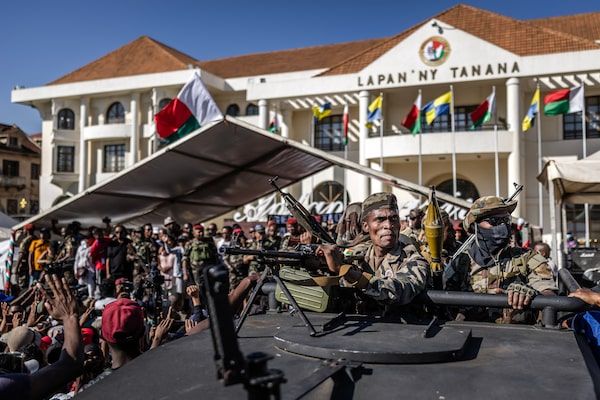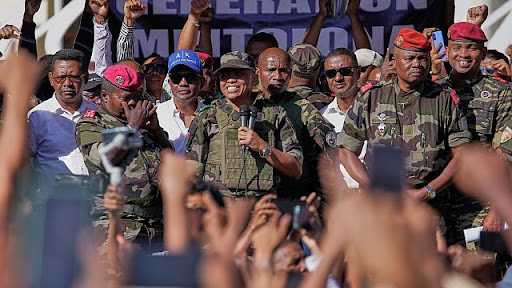The African Union (AU) has suspended Madagascar from all its activities and decision-making bodies following Tuesday’s military takeover that ousted President Andry Rajoelina, plunging the island nation into yet another period of political uncertainty.
In a statement released early Wednesday, the AU’s Peace and Security Council said the suspension would remain in effect “until constitutional order is restored” and condemned the coup as a violation of the Union’s fundamental principles on democratic governance and constitutional rule. The decision was made after an emergency session convened in Addis Ababa, where member states expressed deep concern over the escalating tensions in Madagascar.
According to the statement, the AU will monitor the situation closely and engage with regional and international partners, including the Southern African Development Community (SADC) and the United Nations, to facilitate dialogue and restore stability.

The move came a day after Colonel Michael Randrianirina, leader of an elite military unit, announced that the armed forces had taken control of the government, citing “national instability and corruption” as the primary reasons for the intervention. The colonel declared that the military had assumed temporary authority to “restore order and protect the sovereignty of the Malagasy people.”
President Andry Rajoelina, who was reportedly impeached by Parliament in a tense and controversial vote earlier this week, has not been seen publicly since the announcement. Reports suggest he is under house arrest, though details remain unclear. His removal follows weeks of nationwide protests, economic frustration, and growing divisions within the ruling coalition.
The military takeover has drawn widespread condemnation from regional and global organizations. The United Nations, the European Union, and the United States have all issued statements calling for calm and urging the military to respect democratic processes. The AU’s swift suspension underscores its zero-tolerance policy for unconstitutional changes of government, a principle reaffirmed repeatedly in recent years amid similar crises in parts of West and Central Africa.
AU Commission Chairperson Moussa Faki Mahamat reiterated that the continental body stands firmly against any seizure of power by force. “The African Union condemns the military coup in Madagascar in the strongest possible terms,” he said. “We call for the immediate release of President Rajoelina, the restoration of civilian rule, and a peaceful resolution through dialogue.”
The suspension means Madagascar loses its voting rights and participation in AU meetings and programs until democratic order is reestablished. Historically, such suspensions have remained in effect until credible elections are held or transitional governments commit to a roadmap acceptable to the AU and the international community.

Madagascar, one of Africa’s most politically volatile nations, has faced repeated coups and contested transitions since gaining independence from France in 1960. Rajoelina himself first came to power in 2009 after leading a coup against then-President Marc Ravalomanana. Although he later returned to office through elections in 2018, his presidency has been marred by allegations of authoritarianism, corruption, and economic mismanagement.
Analysts say the current crisis exposes deep-seated frustrations among the Malagasy population over worsening living conditions and political instability. Despite being rich in natural resources, Madagascar remains one of the poorest nations in the world, with nearly 75% of its population living below the poverty line. Recent increases in food prices, unemployment, and public sector corruption have fueled growing public discontent.
Colonel Randrianirina, in his televised address, pledged that the military would organize “inclusive national consultations” to decide the way forward. However, no clear timeline has been set for returning to civilian rule. Observers worry that without immediate diplomatic intervention, the country could slip into a prolonged period of uncertainty similar to previous crises that crippled its economy and isolated it internationally.
The Southern African Development Community (SADC), to which Madagascar belongs, has also condemned the coup and announced plans to send a fact-finding mission to Antananarivo in coordination with the AU. A joint mediation effort is expected to be proposed, focusing on the release of political detainees, restoration of constitutional governance, and the scheduling of fresh elections.
Reactions within Madagascar remain divided. While some citizens have expressed relief over the military’s promise to “clean up” governance, others fear a return to the political chaos that characterized past coups. Civil society organizations and church leaders have urged both the military and political class to prioritize dialogue over confrontation.
International financial institutions, including the World Bank and the International Monetary Fund, are also closely monitoring developments. A military takeover could jeopardize ongoing aid programs and investment projects, which are critical to Madagascar’s fragile economy.
The AU’s decision aligns with its 2000 Lomé Declaration and the 2007 African Charter on Democracy, Elections and Governance, both of which call for the automatic suspension of any member state that experiences an unconstitutional change of government. In the past decade, similar measures have been taken against Mali, Burkina Faso, Guinea, and Niger following military coups.
For now, the AU’s call for restraint and dialogue reflects a growing concern about the resurgence of military interventions across Africa. Analysts warn that if not addressed decisively, such events could undermine the continent’s long-term democratic consolidation and erode public trust in political institutions.
Madagascar’s suspension marks yet another test of the African Union’s ability to uphold democratic values while balancing the need for pragmatic engagement with member states facing internal turmoil. As diplomatic pressure mounts, all eyes are now on Colonel Randrianirina and the transitional military leadership to see whether they will heed calls to restore civilian rule or risk deepening the nation’s isolation.
Madagascar Military Declares Takeover Following President’s Impeachment

